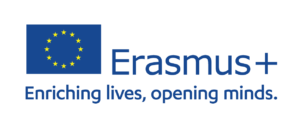Aim of the questionnaire
We are conducting this 15-minutes long survey to map the existing knowledge, needs and challenges regarding green skills and diversity & inclusion in the workplace. The survey is part of the Inspiring the Minds, the project co-funded by the Erasmus+ programme. The feedback collected from this survey will be used to design an innovative interdisciplinary course that will promote the adoption of the new skills and competencies among students that are currently missing in the labour market.
By participating on this survey you will help the Inspiring the Minds team to get an overview of the current situation at your workplace.
Your personal data is protected under EU laws it is encrypted automatically so no one has access to it. You have an option to or not to provide us with personal data which will be used only for contacting you to participate in other activities related to the Inspiring the Minds project. You have the right to change your opinion by contacting us at tamer.abu-alam@uit.no.
Thank you for your participation.
Definition of terms used in the diversity & inclusion section
Cultural Diversity: The word “cultural diversity” means to consider and include individuals and groups representing different cultures, religions and/or languages. These groups/people may be defined as minority groups in your country (according to the UNESCO definition). Although the definition does concern the intersection between the individual’s culture and other characteristics such as gender, age or religion, this definition solely refers to ‘cultural diversity’, not ‘diversity’ at large.
The “Cultural diversity” from an individual perspective can be defined as: the manifold ways in which the cultures of groups and societies find expression. These expressions are passed on within and among groups and societies. Cultural diversity is made manifest not only through the varied ways in which the cultural heritage of humanity is expressed, augmented and transmitted through the variety of cultural expressions, but also through diverse modes of artistic creation, production, dissemination, distribution and enjoyment, whatever the means and technologies used the 2005 Convention on the Protection and Promotion of the Diversity of Cultural Expressions (page 17)).
People with disabilities: are those “who interact with a variety of disabilities and have long-term physical, mental, intellectual or sensory impairments that may hinder their full and effective participation in society on an equal basis with others” (According to UN/EU definition: the 2008 UN Convention on the Rights of Persons with Disabilities.
Minorities/underrepresented groups or ‘marginalised groups’ means non-dominant groups that are usually numerically less than the majority population of a State or territory in terms of their ethnic, religious or linguistic characteristics and maintain (albeit indirectly) solidarity with their own culture, tradition, religion or language. In the current survey, “Women” is considered an underrepresented group. According to the definition of International Migration Law No. 34 – Dictionary of Migration/EU.
The European Institute of Gender Equality define the ‘marginalised groups’ as, those who have historically been discriminated against and still suffer structural challenges to their well-being.
Discrimination: Any distinction, exclusion or restriction for minorities/underrpresentative groups or people with disabilities. The discrimination may represent a basis for impairing, nullifying the recognition and/or unequal recognition of human rights and fundamental freedoms in the political, economic, social and cultural fundamental freedoms (based on the Convention on the Protection and Promotion of the Diversity of Cultural Expressions).
Definition of terms used in the green skills section
Green skills are the knowledge, abilities, values and attitudes needed to live in, develop and support a sustainable and resource-efficient society. The need to transition towards more environmentally sustainable modes of production and consumption has become imperative, for developed as well as developing countries (Based on UN definition).
If you found any difficulties to access the survey or you would like to use your mobile, please use this external link: https://qfreeaccountssjc1.az1.qualtrics.com/jfe/form/SV_9Aj6rq7dK17cikC

